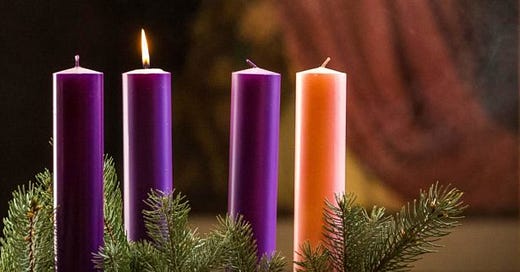Sunday Stretch: Vol. 104, Advent I
Start off your week with a grounded take on Bible, prayer, the world, and your life ...
Hi Readers,
Here we go! Just four more weeks until Christmas. I have a few rules for myself this time of year, which may or may not be helpful - but I follow them nonetheless.
One of the rules is that I don’t start doing any kind of Christmas celebrations/decorations/music/etc until after Thanksgiving. I insist on holding on to fall and pumpkins as long as I can.
I also really insist that as a family, each week, we find a way to gather around the Advent wreath and candles, and spend just a few moments sharing in prayer, a short Bible reading, and maybe a carol or two. It’s nothing super deep or fancy (I got the Advent wreath at IKEA a few years ago), and maybe my kids will be more resistant to it as they get older — but for now it’s a guaranteed few moments of quiet, peace, and connection at a time of year that can be really stressful and sometimes sad. I’m anticipating a fair amount of grief this year in the wake of my father-in-law’s death in September, so I want to find ways to hold all of the feelings that the season brings, and also invite God’s promised peace and gift of Jesus’ presence among us.
All that being said … let’s get to the texts!
(And in case you missed it: here’s a meditation for the First Week of Advent, focused on Hope)
HOPE
We begin again this week in the church year, the season starting over again with Advent, those short and dark winter days when the sun sets in some places before 5 p.m.
Bible Stories
Jeremiah 33:14-16
Jer. 33:14 The days are surely coming, says the LORD, when I will fulfill the promise I made to the house of Israel and the house of Judah. 15 In those days and at that time I will cause a righteous Branch to spring up for David; and he shall execute justice and righteousness in the land. 16 In those days Judah will be saved and Jerusalem will live in safety. And this is the name by which it will be called: “The LORD is our righteousness.”
This brief reading from the Prophet Jeremiah is one of those Bible readings that lets me know it’s really time for Advent. It reminds me, always, of walking into a dark cave in the holy city of Bethlehem (West Bank: Palestine), which marks the historical location of Jesus’ birth, according to tradition.
Inside that cave are carvings on the wall written by Christians from many centuries ago. As one who was likely of Gentile origin, grafted into the olive tree by Jesus’ grace, to come to this holy place felt both ancient, distant, and present - all at once. Those words represent to me the Christmas season. Many of the carvings reference prophecies that foretold, for Christians, of Jesus’ birth.
But perhaps what I need to hear most this week is those first eight words: The Days are Surely Coming, says the LORD. I don’t know about you, but sometimes it feels as though I’m desperately awaiting some Good News. (Then, I remember, each day it’s also all around me). But in these words I remember the promise of Christmas. The Days, the promise, the Love and presence of God: is surely coming and indeed already here.
Questions to Ponder
Why do you think the Prophet Jeremiah had to tell those who listened to him that “the days are surely coming”?
What do a people who lived in a time of Exile have to share with us today?
Do some reading and research about the Babylonian Captivity, which represents the time of the writing of the Prophet Jeremiah.
1 Thessalonians 3:9-13
1Th. 3:9 How can we thank God enough for you in return for all the joy that we feel before our God because of you? 10 Night and day we pray most earnestly that we may see you face to face and restore whatever is lacking in your faith.
1Th. 3:11 Now may our God and Father himself and our Lord Jesus direct our way to you. 12 And may the Lord make you increase and abound in love for one another and for all, just as we abound in love for you. 13 And may he so strengthen your hearts in holiness that you may be blameless before our God and Father at the coming of our Lord Jesus with all his saints.
The letter to the Thessalonians is one of the first of Paul’s letters in the Bible, and it’s generally not as well-known or as oft-cited as his other letters, like to the Romans or the Galatians or Corinthians. Nonetheless, the simplicity of this passage rings true: Paul’s gratitude and love for the Church.
There is a desire in this passage for restoration. Why do you think even in the early church Paul felt this need for restoration of faith, so shortly after Jesus’ death and resurrection?
What kind of holiness do you think Paul is prescribing in verse 13?
And what about blamelessness? Why is blame a destructive concept in this sense?
Luke 21:25-36
Luke 21:25 “There will be signs in the sun, the moon, and the stars, and on the earth
Keep reading with a 7-day free trial
Subscribe to I'm Listening to keep reading this post and get 7 days of free access to the full post archives.




